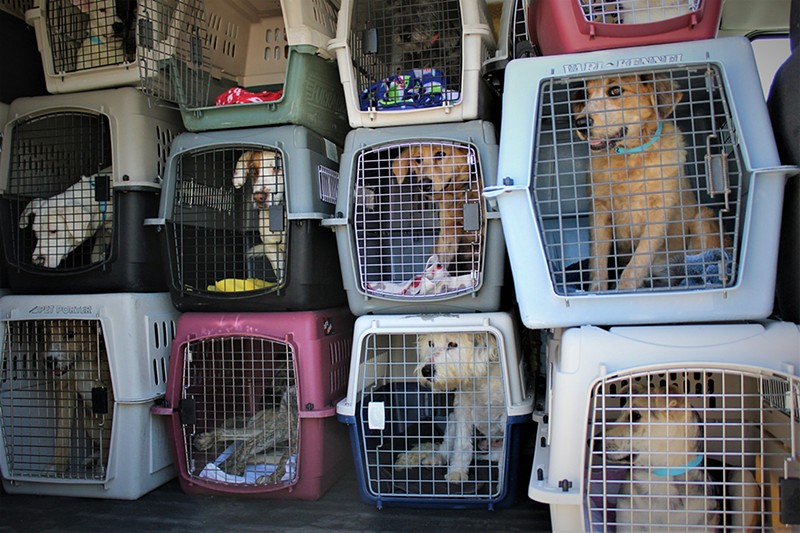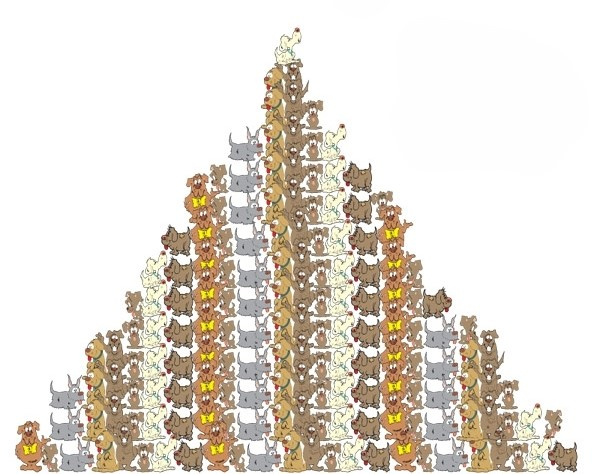

In Colorado, we’ve got a trafficking problem. We’re not talking about drugs, or people, or other illicit things – we’re talking about homeless animals, specifically dogs. Every year, tens of thousands of dogs, mostly puppies, are collected and transported by Colorado animal rescues and shelters from states like Texas, New Mexico, and Oklahoma, where pet overpopulation is a significant problem.
Colorado Canine Importation by the Numbers
From 2021 – 2023:
- 197 animal rescues reported having taken in homeless dogs, of which 80% took in dogs from outside Colorado.
- The 10 largest of these animal rescues imported more than 30,000 dogs into Colorado from other states. These 10 rescues account for 45% of total out-of-state imports and, for several rescues, imports make up nearly all of their intake. That is to say, they do not help any Colorado dogs.
- The remaining 187 rescues imported nearly 38,000 dogs from outside Colorado.
- Animal rescues imported into Colorado MORE THAN SIXTY-EIGHT THOUSAND dogs in three years’ time, accounting for 72% of all intake.
The Numbers Behind the Numbers…Puppies
The largest animal rescues import far more puppies than adult dogs for one reason – it is simply more profitable.
During the period 2021 – 2023:
- The 10 largest animal rescues imported nearly 19,000 puppies into Colorado from other states, accounting for 62% of total dogs imported by these rescues during the three-year period and 55% of total intake.
Adding Insult to Injury…More Puppies!
For many years, Colorado law has required rescues and shelters to alter all pet animals before adoption. However, large puppy importers have routinely found their way around these requirements and adopted unaltered dogs and puppies without consequence. Motivated by profit, these disreputable rescues avoid the cost of the sterilization procedure and expedite adoptions despite the impact to animals and communities.
What does that impact look like? If just one unaltered female dog has a litter, and all her female descendants are not altered, that one unaltered female dog can produce 67,000 dogs over six years’ time.
Using the same mathematical equation, we can see below how many dogs can be produced by just the three largest puppy importers over a period of six years using varying assumptions. We’ve done our calculations assuming 50%, 75%, 95%, and 99% of female dogs imported by these rescues from 2021 – 2023 are spayed prior to having a litter. Even if these three large puppy importers ensured 99% of the puppies they import are sterilized, the impact to Colorado’s pet population could be an additional THREE-AND-A-HALF MILLION additional dogs over six years’ time. There’s no way to know for sure what impact rescues failing to alter their puppies has on pet overpopulation, but it is not zero.

Colorado Shelters Also Import Dogs
Animal rescues aren’t the only ones importing dogs from out-of-state. Some of Colorado’s animal shelters are also guilty of importing dogs from other states. As the table below illustrates, there are three Front Range shelters that accounted for 71% of all dogs imported by Front Range shelters.
While they are diligent about sterilizing animals prior to adoption, when shelters import dogs, they are still displacing Colorado dogs in need of homes.
This Should Concern All Coloradoans
Every dog or puppy that comes into our state from somewhere else displaces a Colorado dog that needs a home. Homeless Colorado dogs sit in shelters, sometimes languishing until the end comes for them. During 2021 – 2023, while MORE THAN SIXTY-EIGHT THOUSAND dogs were imported into Colorado, nearly 13,000 dogs were euthanized. We don’t know to what extent euthanasia rates are correlated to out-of-state imports, but it is reasonable to assume there is some impact and it’s not good for Colorado dogs, especially the adult dogs. We do know that euthanasia is directly related to pet overpopulation, which is a real problem when rescues are failing to alter imported puppies.
We think the following actions need to be taken to focus on Colorado dogs and discourage irresponsible rescue practices.
- Regulate Retail Rescue: Rescue organizations that collect from out-of-state shelters are essentially pet stores without the stigma… they are retail rescues. They obtain their product (puppies) for free, transport their product to Colorado to be sold, charge an above-average price, and fail to sterilize animals prior to transferring ownership. There are only two differences between retail rescues and pet stores: 1) most retail rescues do not have brick-and-mortar facilities, but the largest ones do, and 2) retail rescues do not have to buy their product from breeders or brokers, they get it for free. Retail rescues should be subject to a higher licensing fee and also be held to sterilization standards without exception.
- Prohibit Non-Profit Shelters from Importing Animals: Because animal shelters receive community and state/local funding, we think they should voluntarily, or if needed mandatorily, cease to import dogs into Colorado.

Thank you so much for this. I’m with Homeward Bound Rescue of Colorado and I’ve been telling everyone I talk to about this. We are a very small rescue in northern Colorado and just handle Colorado dogs. We are over capacity right now because no one is adopting. I get more surrender calls than calls to adopt.
Now that I know about you, I’ll continue to follow you. Thank you for getting the message out.
Cindy – I know of Homeward Bound and love what you all are doing! As advocates, we try to educate and inspire change, but only the shelter and rescue community can take the actions necessary to do things differently. Thank you for being a part of what we’re doing and we look forward to your input here and on Facebook!